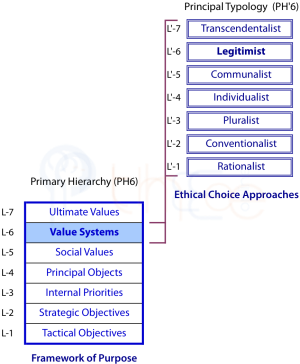Ethics and Social Life
Our Core Obligations

The exercise of , consciously or unconsciously, is the way that everyone everyday demonstrates responsible membership of their society—as well as membership of humanity. (For the difference between these two memberships, go here.)
Ethical conflicts are just another example of diversity in society, a diversity that occurs whatever the political context or form of government. Many, perhaps most, conflicts are based on the use of sharply different doctrines for choosing.
Inquiry has revealed that distinct are part of the . The approaches are a special sort of «» and form a nested Principal Typology as shown in the diagram at right.
There are seven fundamentally distinct ways of going about , with each built on a distinctive .
For details, download Ch.6![]() in Working with Values.
in Working with Values.
![]() The 7 Core Obligations & Approaches/Doctrines
The 7 Core Obligations & Approaches/Doctrines
The various do not prescribe exactly what choice must be made in any particular situation. Instead they determine how a person approaches the making of a choice so that it can be deemed and defended as genuinely ethical within their social groups and society.
Some Properties relevant to Politics.
| L' | The Ethical Choice Approach urges: |
Aspiration (Constraint) |
Virtue (Vice) |
|---|---|---|---|
| I | Be reasonable! |
Find solutions (given the realities) |
Wisdom
(Folly) |
| II | Follow what is acceptable! |
Maintain continuity (in the face of change) |
Moderation
(Extremism) |
| III | Benefit your group! |
Pursue group ideals (using potentials) |
Prudence
(Recklessness) |
| IV | Benefit yourself! |
Develop strength (despite vulnerabilities) |
Courage
(Arrogance) |
| V | Benefit everyone! |
Be altruistic (on the basis of egoism) |
Benevolence
(Indifference) |
| VI | Be fair! |
Seek the common good (allowing for autonomy) |
Justice
(Injustice) |
| VII | Be authentic! |
Foster spirituality (in a temporal context) |
Integrity
(Corruption) |
How People Differ
Each approach has its own assumptions; and these generate logical and emotional incompatibilities with the others.
People differ in their preferences—typically preferring one or two as «truly ethical», even if they use them all from time to time. So «» or «mindset» rather than «preference» better fits a person’s use of an approach.
As a result, hostility and condemnation may emerge amongst people pursuing what is good and right in their own «personally correct» way.
-
Read more about making ethical choices.
OR
- Continue to the linkage of ethics and politics .
Originally posted: July 2009; Last updated: 24-Feb-2014